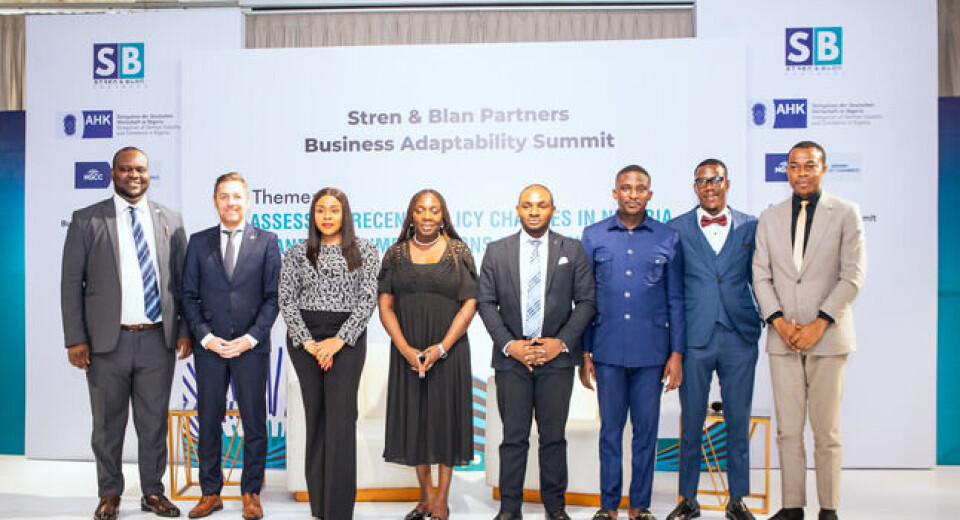Copyright : Re-publication of this article is authorised only in the following circumstances; the writer and Africa Legal are both recognised as the author and the website address www.africa-legal.com and original article link are back linked. Re-publication without both must be preauthorised by contacting editor@africa-legal.com
Hope for policy stability in Nigeria

As part of its contribution towards driving the discourse for a robust economy, Stren & Blan Partners, recently hosted a Business Adaptability Summit in collaboration with the Nigerian-German Chamber of Commerce (NGCC) and AHK.
Stren & Blan Partners, a full-service commercial law firm, hosted the one-day event titled “Assessing Recent Policy Changes in Nigeria and their Implications for Businesses” on 24 October 2023.
The one-day event which focused on “Assessing Recent Policy Changes in Nigeria and Their Implications for Businesses” was held at the Radisson Blu Hotel, Ozumba Mbadiwe Way, Victoria Island, Lagos State. The event had in attendance industry experts and business executives.
The Opening Address was delivered by the Managing Partner of Stren & Blan Partners, Christian Aniukwu, who gave an introduction to the Firm and its expertise. He further highlighted the primacy of the event and its implications for businesses.”
In her welcome speech, the Director General of the NGCC, Marylin Rapu, underscored the significance of the event in shaping the economy and establishing valuable collaborations between industry leaders. Igbuan Okaisabor, President of the NGCC, emphasised the need for businesses to adapt, especially in the face of multi-faceted challenges like Covid-19, the Russia–Ukraine War, the Israel–Palestine Crisis, the devaluation of the Naira and the high inflation rate. Timo Leyer, the delegate from the Delegation of German Industry and Commerce in Nigeria (AHK), highlighted Nigeria’s significance to Germany in terms of trade, and spoke passionately about AHK’s commitment to making Nigeria Germany’s biggest trade partner in Africa.
In his session, the founding partner of Stren & Blan Partners, Amala Umeike, spoke extensively on Nigeria’s policy pulse and macroeconomic outlook from a regulatory perspective. Although policy inconsistency is a major challenge that businesses have to grapple with in Nigeria, he noted that there was hope for relative stability in terms of policy, given the policy direction of the new government. He pointed out that while sweeping reforms are needed for economic growth, there is also a need for the government to administer palliative measures in a bid to cushion the effects of the reforms on the populace.
Amala also noted that the reforms in the foreign exchange market as well as the fuel subsidy removal could potentially set Nigeria on the path of true economic recovery. He went on to point out the significance of the Business Facilitation Act, and the need for regulators to implement the provisions of the Act in their operations in order to create a more enabling environment for businesses.
Amala also highlighted the need for businesses to strengthen their compliance with relevant laws. Pointing to the Arbitration and Mediation Act of 2023, he also preached the gospel of alternative, inexpensive ways of resolving disputes, like third-party funding which was introduced by the Act.
Despite the challenges, he believes that Nigeria remains a dream investment destination with boundless potential for businesses.
Noble Obasi, the team leader of Stren & Blan Partners’ Capital Market, Mergers & Acquisitions and Private Equity Department, spoke on policy changes affecting financial services, foreign exchange and capital markets. He specifically highlighted the opportunities abounding in Nigeria’s emerging fintech market.
Ozioma Agu who heads the Stren & Blan Partners’ Energy, Finance and Infrastructure Department, spoke extensively on policy changes affecting the oil and gas and energy sector investment landscape in Nigeria. She explored the transformative changes in the electricity industry which were pioneered by the Electricity Act, but pointed out that insecurity, oil theft and pipeline vandalism are among the challenges that threaten Nigeria’s energy sector.
Ozioma made a passionate case for the government to prioritise security in the oil and gas production chain in order to foster economic growth and progress in Nigeria. Her recommendations include the government making practical policies with practical consequences and providing one-stop centres for reducing bureaucracy and streamlining registrations and approval processes for investors.
The last session of the event was led by the team leader of the firm’s Tax, Labour and Immigration Practice Group, Marvis Oduogu, who spoke on policy changes affecting the manufacturing sector. Oduogu highlighted that it’s crucial for businesses to fully understand the country’s tax laws and requirements to stay abreast of their obligations.
To join Africa Legal's mailing list please click here
